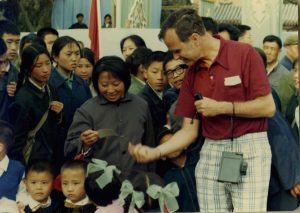On October 23, an interesting event occurred at 55 Anjialou Road, Beijing, where the official residence of the United States Embassy in China was officially named “Bush House.” The naming ceremony was presided over by the current U.S. ambassador to China, Nicholas Burns, and witnessed by Ma Zhaoxu, China’s executive vice foreign minister. The event went largely unnoticed in a time filled with international conflicts and domestic emergencies.
It is a tradition in American diplomacy to name U.S. embassy residences after notable Americans. For example, the U.S. Embassy residence in Greece is known as “Jefferson House,” the residence of the U.S. Mission to NATO is called “Truman Hall,” and the U.S. Embassy residence in the U.K. is named “Winfield House.” In this case, Burns chose to name the residence after George H.W. Bush and his wife, Barbara Bush, after reviewing a list including all the envoys to China for the last 180 years.
George H.W. Bush, best known as the 41st president of the United States, also served as vice president, director of the Central Intelligence Agency, and chief of the U.S. Liaison Office in Beijing from 1974 to 1975. In the latter role, in particular, Bush played a crucial role in breaking the ice in the early stages of Sino-U.S. diplomacy; in the period before China and the United States had normalized their diplomatic relations, the U.S. liaison was the de facto U.S. ambassador to China. When Bush passed away in 2018, Chinese President Xi Jinping referred to him as an “old friend of the Chinese people” and acknowledged his significant contributions to China-U.S. relations in a letter to then-U.S. President Donald Trump.
Bush was a well-known figure in China. During his time as the chief of the U.S. Liaison Office in Beijing, he was known for frequently riding a bicycle through the streets and hutongs of Beijing, earning him the nickname “the bicycling ambassador.”

George H.W. Bush rides his bike in China, 1975. Photo via George H.W. Bush Presidential Library and Museum
As Stephen Knott, a U.S. Naval War College professor, has noted, as president, George H.W. Bush’s foreign policy exhibited a combination of conservatism and pragmatism. He adopted an “engagement” strategy toward China during his presidency and set the record for the shortest amount of time elapsed between assuming office as the U.S. president and visiting China, which he did in February 1989.
In January 1989, Bush emphasized the “firm and important strategic, commercial, and cultural relationship” between the U.S. and China in a press conference before his visit to China. He also spoke of his close personal relationship with Chinese leader Deng Xiaoping. During his visit, Bush stated to Xinhua News Agency that the U.S. should seek to expand cooperation with China in politics, economics, technology, military affairs, and education, while acknowledging that differences in the China-U.S. relationship were “inevitable.” He encouraged both sides to address these differences with a “constructive” spirit for the benefit of both nations.
In a meeting with then-Chinese Vice Premier Wan Li, Bush expressed that for China-U.S. relations, “the sky’s the limit,” indicating endless possibilities. (Interestingly, in June 2023, the same phrase was used by Jake Sullivan, the current U.S. national security advisor, to describe India-U.S. relations.)
That optimism was short-lived. The Chinese authorities took strong action toward pro-democracy protesters just a few months after Bush’s visit. The undesirable response, which was defended by Chinese state media, prompted concerns and sparked outrage in the United States, and China-U.S. relations dipped to their lowest point since normalization. Even then, Bush remained committed to the relationship. He emphasized the need for “rational and prudent action, taking into account America’s long-term interests and an understanding of the complex internal situation in China.”
Bush maintained his stance of not wanting to see the relationship break down completely. He sent National Security Advisor Brent Scowcroft, and Deputy Secretary of State Lawrence S. Eagleburger on a secret mission to China in July 1989 to prevent a complete rupture in China-U.S. relations, which irritated U.S. lawmakers. Bush explained to Congress that he believed Beijing played a “critical role” in global affairs, which is why he wished to improve and maintain a positive relationship with China. In his defense of the secret mission, Bush said the visit by Scowcroft had “practical results.”
However, as a South China Morning Post commentary in 2018 pointed out, the era of George H.W. Bush seems to have ended. Subsequent U.S. leaders, especially President Donald Trump, disrupted the traditional pragmatism at the heart of the China-U.S. relationship. The SCMP commentary was published on the eve of the Trump-Xi meeting in Buenos Aires, and at the time the author still held onto a fading optimism toward an improved future of China-U.S. relations. However, bilateral relations have only soured in the five years since that meeting.
The Trump administration viewed China as an existential threat to the United States, leading to a sharp decline in China-U.S. relations. This narrative did not go unchallenged. In July 2019, 90 American scholars and policy analysts sent a joint letter to Trump and the U.S. Congress, expressing concerns that the White House’s strongly adversarial stance undermined the influence of those Chinese officials who advocated for cooperation with Western countries. They argued that U.S. policy toward China should be based on a “realistic assessment” rather than exaggeration.
Current U.S. President Joe Biden’s policies, while differing in rhetoric from Trump, continued many of the restrictions on China introduced during the previous administration and embraced a value-driven and ideologically opposed approach to China. With the Biden administration strengthening alliances and redefining China as a “strategic competitor,” China-U.S. relations were drawn into a new era of systemic competition.
China-U.S. relations cannot return to the past as the times and situations have changed. That said, the world is currently facing global issues – from wars and arms races to climate change, global health, and digital governance questions – that cannot be tackled without good-faith cooperation from both sides. In this context, the international community is once again facing a lack of global leadership, and nations are struggling to take on the responsibility of leading global development and addressing global issues and risks on their own. Against this backdrop, the world is calling for a return to pragmatic cooperation in China-U.S. relations, and international relations writ large.
As Chinese President Xi Jinping said during a meeting with U.S. Senate Majority Leader Schumer in October, “There are a thousand reasons to make Sino-U.S. relations work, and no reason to break them.” Global governance requires the two major powers, the United States and China, to recognize their differences while adopting a more pragmatic and cooperative attitude toward each other.
Naming the U.S. Embassy residence in China “Bush House” is an easy step, which might imply and symbolize a nostalgia for an era of pragmatic China-U.S. relations. Revitalizing the spirit of a bygone era in bilateral relations, especially in terms of addressing urgent global issues, however, will still require joint efforts from both sides.

































